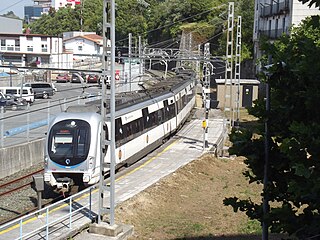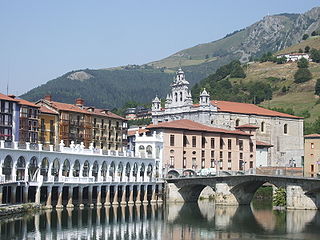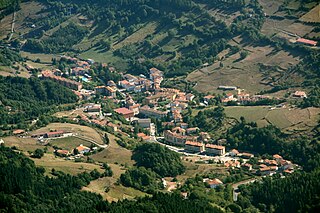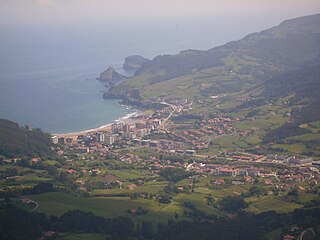
Euskotren Trena, formerly known just as Euskotren is a commuter, inter-city and urban transit train-operating company that operates local and inter-city passenger services in the provinces of Biscay and Gipuzkoa, in the Basque Country, Spain. It is one of the four commercial brands under which Euskotren operates, as a public company managed by the Basque government. The entire 181.1-kilometre (112.5 mi) network uses 1,000 mm narrow gauge rail tracks which have been owned by the Basque Government since their transferral from the Spanish government; the rail tracks and stations were part of the FEVE network until its transferral. Euskotren Trena also operates the Donostia/San Sebastián metro under the brand Metro Donostialdea.

Biarritz is a city on the Bay of Biscay, on the Atlantic coast in the Pyrénées-Atlantiques department in the French Basque Country in southwestern France. It is located 35 kilometres (22 mi) from the border with Spain. It is a luxurious seaside tourist destination known for the Hôtel du Palais, its casinos in front of the sea, and its surfing culture.

Gipuzkoa is a province of Spain and a historical territory of the autonomous community of the Basque Country. Its capital city is Donostia-San Sebastián. Gipuzkoa shares borders with the French department of Pyrénées-Atlantiques at the northeast, with the province and autonomous community of Navarre at east, Biscay at west, Álava at southwest and the Bay of Biscay to its north. It is located at the easternmost extreme of the Cantabric Sea, in the Bay of Biscay. It has 66 kilometres of coast land.

Tolosa is a town and municipality in the Basque province of Gipuzkoa, in northern Spain. It is located in the valley of the river Oria, next by Uzturre, a local mountain topped by a white cross.

Aia is a village situated on the slopes of Mount Pagoeta in the Basque province of Gipuzkoa, Spain. It is located 30 km to the west of Donostia-San Sebastián and about 10 km inland from the coastal town of Zarautz. Aia is set amongst hills and forests, and surrounded by mountains. The town has a large church, the Church of San Esteban, which includes a notable centrepiece. The population of Aia has gradually declined since the 1950s, to a population of 1,750 in 2005.

Alkiza is a rural municipality in the centre of Gipuzkoa, northwest of the Tolosaldea County, in the Basque Country. It is 27 kilometres south of San Sebastian. In 2019 it had 373 inhabitants, of which 88.8% were Basque speakers. Alkiza is an independent municipality since 1731; previously it depended on Tolosa and San Sebastian.

Zegama, popularly known as "The shadow of Aizkorri", is a town and municipality in the Goierri region of the province of Gipuzkoa, in the autonomous community of the Basque Country, northern Spain.

Leintz Gatzaga is a town located in the province of Gipuzkoa, in the Autonomous Community of Basque Country, northern Spain. The municipality's population is 251 (2015).

Orio is a fishing town located in the province of Gipuzkoa in the Basque Autonomous Community, northern Spain, with the town nucleus lying on the river Oria, roughly one mile away from its mouth by the Bay of Biscay. Orio had a population of 5,901 inhabitants as of 2016.

Usurbil is a town and region located in the province of Gipuzkoa in the Autonomous Community of the Basque Country, in the North of Spain.

Bakio is a municipality in the province of Biscay, Basque Country, Spain.

Getxo is a town located in the province of Biscay, in the autonomous community of the Basque Country, in Spain. It is part of Greater Bilbao, and has 77,946 inhabitants (2019). Getxo is mostly an affluent residential area, as well as being the third largest municipality of Biscay.

Ea is a town and municipality located in the province of Biscay, in the autonomous community of Basque Country, northern Spain.

Agurain in Basque and Salvatierra in Spanish, it is a town and municipality located in the province of Álava in the Basque Autonomous Community, northern Spain. The municipality, numbering 4,986 inhabitants (2015), is in turn the head town of the district or Cuadrilla of Salvatierra. The gross income per family amounts to 6,784 €. With reference to workforce by economic sectors, 10.36% are employed in agriculture, 35.78% in the industry sector, 47.92% in the service sector and 5.95% in the construction industry.

Bardos is a commune in the Pyrénées-Atlantiques department in the Nouvelle-Aquitaine region of south-western France. It is part of the former Basque province of Labourd.

Getaria is a town on the Urola coast, in the province of Gipuzkoa, in the autonomous community of the Basque Country, in northern Spain. It borders Zarautz to the east and Zumaia to the west.

Hernani is a town and municipality located in the province of Gipuzkoa, Basque Autonomous Community, Spain. The town sits on the left bank of the Urumea river. It is located at a distance of 9.2 km from San Sebastián. The municipality of Hernani occupies an area of approximately 40 square kilometres and is bordered by San Sebastián, Astigarraga, Arano, Elduayen, Errenteria, Lasarte-Oria and Urnieta.

The Leitzaran is a river and a valley in the Navarre and the Basque Country (Spain). It flows into the river Oria from its right.

San Sebastián, officially known by the bilingual name Donostia / San Sebastián, is a city and municipality located in the Basque Autonomous Community, Spain. It lies on the coast of the Bay of Biscay, 20 km from the France–Spain border. The capital city of the province of Gipuzkoa, the municipality's population is 188,102 as of 2021, with its metropolitan area reaching 436,500 in 2010. Locals call themselves donostiarra (singular), both in Spanish and Basque. It is also a part of Basque Eurocity Bayonne-San Sebastián.

Bakartxo Tejeria Otermin is a Basque politician serving as speaker or President of the Basque Parliament since 2012. She is the third woman to hold the position, as well as the longest serving speaker. Tejeria has been a Member of the Basque Parliament for Gipuzkoa since 2001. She is affiliated with the Basque National Party.























